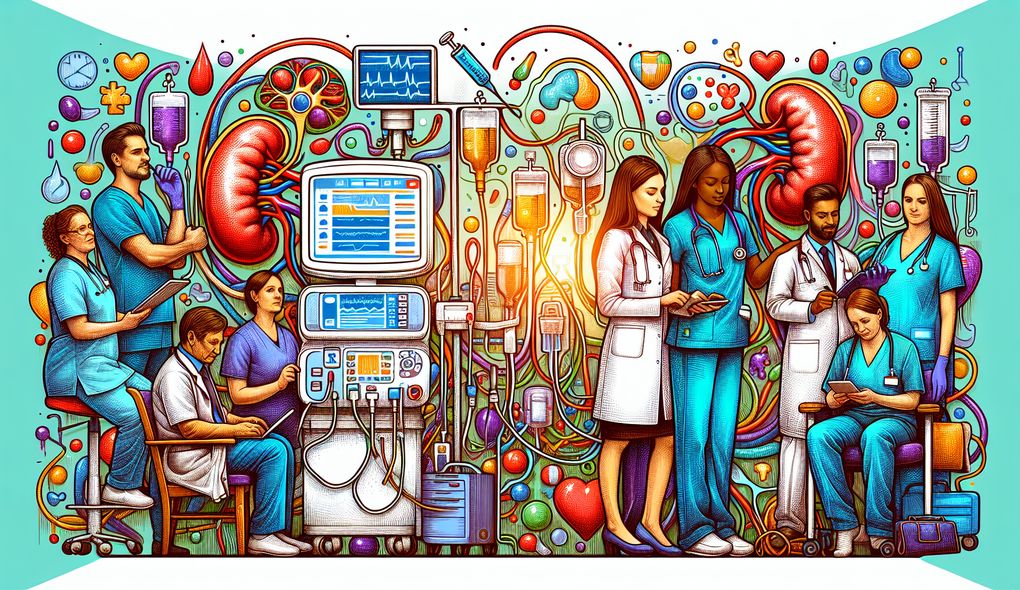Tell us about a time when you provided exceptional care to a patient with renal diseases. What made it exceptional?
SENIOR LEVEL

Sample answer to the question:
One time, I had a patient with renal disease who was experiencing severe pain and discomfort. I provided exceptional care by promptly assessing the patient's condition, administering pain medication, and closely monitoring their vital signs. I also took the time to educate the patient about their condition and the importance of adherence to their treatment plan. What made it exceptional was the personalized care and attention I provided, ensuring the patient felt supported and well-informed throughout their journey.
Here is a more solid answer:
During my time as a nephrology nurse practitioner, I encountered a patient with advanced renal disease who was experiencing multiple complications. To provide exceptional care, I utilized my strong clinical skills in nephrology to accurately assess and diagnose the patient's condition. I collaborated with a multidisciplinary team to develop a comprehensive care plan that addressed the patient's specific needs. This involved coordinating dialysis treatments, adjusting medication regimens, and closely monitoring the patient's lab results and vital signs. To ensure effective communication, I regularly met with the patient and their family to provide updates, answer questions, and offer emotional support. Additionally, I took on a leadership role in mentoring junior nursing staff, providing guidance and support to enhance their knowledge and skills in nephrology nursing.
Why is this a more solid answer?
The solid answer includes specific details about the candidate's clinical skills in nephrology and their ability to develop and implement complex patient care plans. It also highlights their communication and leadership skills in providing exceptional care. However, it could be further improved by discussing the candidate's proficiency in electronic medical records and healthcare technology, as stated in the job description.
An example of a exceptional answer:
Let me share with you a memorable experience when I provided exceptional care to a patient with renal disease. The patient was struggling with the management of their chronic kidney disease and was feeling overwhelmed by the treatment process. To provide exceptional care, I approached the patient with empathy and actively listened to their concerns and fears. I developed a personalized care plan that not only addressed their medical needs but also considered their emotional well-being. This involved incorporating stress-management strategies, connecting them with a support group, and providing educational resources to enhance their understanding of renal disease self-management. By utilizing my expertise in nephrology and my communication skills, I empowered the patient to take control of their health and actively participate in decision-making. The exceptional aspect of this care was the holistic approach I took, ensuring that the patient's physical and emotional needs were met, resulting in improved patient outcomes and overall well-being.
Why is this an exceptional answer?
The exceptional answer goes above and beyond by highlighting the candidate's ability to provide holistic care to patients with renal disease. It demonstrates their empathy, active listening, and personalized approach to patient care. It also addresses the importance of patient education and empowerment in achieving exceptional outcomes. However, it could still be further improved by discussing the candidate's involvement in research and utilization of evidence-based practice, as stated in the job description.
How to prepare for this question:
- Review your experience in providing care for patients with renal diseases, focusing on challenging cases and exceptional outcomes.
- Highlight your clinical skills and ability to develop and implement comprehensive care plans for patients with renal diseases.
- Practice discussing your communication and interpersonal skills, emphasizing your ability to empathize, actively listen, and educate patients and their families.
- Reflect on your leadership and mentorship abilities in a healthcare setting, showcasing examples of how you have guided and supported junior staff.
- Stay updated on the latest advancements in nephrology nursing, including research and evidence-based practices, as this demonstrates your commitment to ongoing professional development.
What are interviewers evaluating with this question?
- Clinical skills in nephrology
- Patient assessment and diagnosis abilities
- Development and implementation of patient care plans
- Communication and interpersonal skills
- Leadership and mentorship abilities

